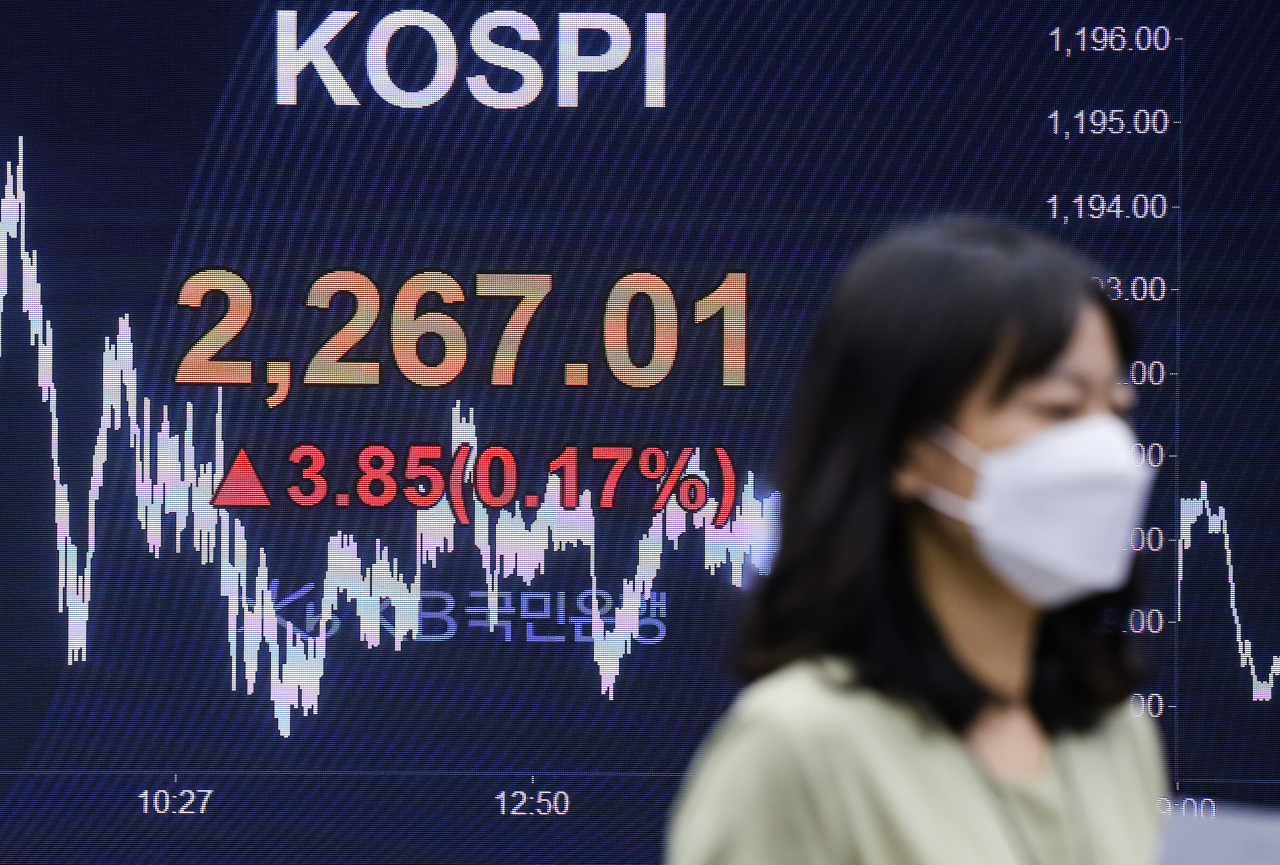 |
A sign at KB Kookmin Bank’s dealing room in Seoul on Thursday shows the Kospi index closed at 2,267.01, just short of its yearly high closing of 2,267.25. (Yonhap) |
South Korea’s main bourse Kospi reached a level not seen in some six months on Thursday, with foreign investors continuing their buying spree for a fifth consecutive session amid the US Federal Reserve’s steady rates and high interest in major tech firms and automakers.
The Kospi opened higher at 2,275.33 -- up 12.17 points, or 0.54 percent, from the previous session. The strong start continued throughout the day to close at 2,267.01, just short of its yearly high closing of 2,267.25 on Jan. 22. The index hit an intraday high of 2,281.33, marking a fresh yearly high since 2,277.23 was seen during trading on Jan. 20.
Foreigners net purchased 222.9 billion won ($186.57 million) of local shares, while institutional investors dumped 234.2 billion won and retail investors, who were net sellers in early trading, ended up turning to net buyers and scooped up 7 billion won in stocks.
The tech-heavy Kosdaq began trading at 812.83, up 4.24 points, or 0.52 percent, from the previous session. Buttressed by retail investors’ buying, the index moved around the 810-level mark throughout the day to land at 814.19 at the closing bell.
Buoyed by the Fed’s unchanged rates near zero, indexes on Wall Street ended higher Wednesday. The Dow Jones Industrial Average rose 0.61 percent to close at 26,539.57. The S&P 500 and Nasdaq also advanced 1.24 percent and 1.35 percent, respectively.
Additional to the Fed’s promise to keep up its support during the COVID-19 crisis, the Bank of Korea and the Fed have agreed to extend a $60 billion bilateral currency swap agreement by six months until March 31 next year, in an effort to help ease lingering market uncertainties.
“A series of positive news such as strong closes of US stocks overnight and the extended currency swap deal boosted the index,” said Seo Sang-young, an analyst at Kiwoom Securities. “However, as some investors seek profit-taking, the index trimmed some earlier gains in the afternoon.”
Other market watchers attributed the stronger Kospi index to the continued rise in market kingpin Samsung Electronics. Additional market heavyweights, such as automakers, also built up some gains in the market.
The tech giant recorded estimate-beating earnings in the second quarter this year. Samsung’s net profit stood at 5.55 trillion won in the April-June period, up 7.23 percent from a year earlier. Its operating profit also jumped 23.5 percent on-year to 8.15 trillion won, while its operating margin stood at 15.4 percent in the cited period, the highest since the fourth quarter of 2018.
Despite the consolidated second-quarter business performance, shares of Samsung Electronics closed flat at 59,000 won. Leading automaker Hyundai Motor gained 2 percent to 127,500 won, with its smaller affiliate Kia Motors rising by 2.65 percent to close at 40,700 won.
Meanwhile, the local currency closed at 1,194.4 won against the US dollar, down 1.3 won from the previous session’s close. It started trading at 1,190 won per dollar and once reached the 1,180 won-level. It was the first time the local currency had traded below 1,190 won per dollar since March 5, when it was 1,182.2 won per dollar.
By Jie Ye-eun (
yeeun@heraldcorp.com)






![[Herald Interview] 'Trump will use tariffs as first line of defense for American manufacturing'](http://res.heraldm.com/phpwas/restmb_idxmake.php?idx=644&simg=/content/image/2024/11/26/20241126050017_0.jpg)
![[Exclusive] Hyundai Mobis eyes closer ties with BYD](http://res.heraldm.com/phpwas/restmb_idxmake.php?idx=644&simg=/content/image/2024/11/25/20241125050044_0.jpg)
